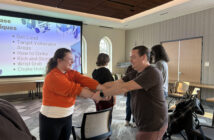
Austin Katz
My name is Austin, and I — like many others in my generation — am a recovering binge-watcher.
While some think this binge-watching addiction in which I watch episode after episode may make me antisocial, I believe binge-watching actually makes a person more social.
With new seasons of award-winning shows coming out every month, it is not hard to see that we are living in the golden age of television. From that, however, comes a sort of burden. I have spent countless nights huddled at my laptop trying to catch up on the latest season of the hottest new show. It’s not a bother because I am not necessarily interested in the show itself. I am actually interested in the social aspect of the show, and I will explain how that works.
If you were to approach a group of college students and ask if they watched the whole new season of a hot Netflix show that came out a few days ago, they would probably say yes. With wide and likely tired eyes, they may then rant about a bunch of characters and theories about the show.
If I am with people and there is a lull in conversation, all I have to ask is, “Which is your favorite ‘Parks and Recreation’ episode?” and there will likely be an eruption of conversation and quotes. There is always common talking ground about television. Whether it is an old episode of a show or a new one, I, and many others, can speak for days about the new silver screen shows on a laptop.
I have noticed that I have made most of my friends by or though our mutual adoration for television. Even though we all have vastly different schedules and live in various dorms and houses on campus, we always find the time to sit down together and watch the newest episode of whatever is popular at the moment. Television has become the entertaining glue that binds us all together that somehow never gets old or stale because there is always something new to say or yell about.
TV has even become a nightly ritual in my home, replacing the traditional family dinners with arguments about superheroes and villains. After a long day, my family will plant in front of the TV at some point during the night and start on the next episode of whatever show, shoveling food down our throats while engrossed in the flashing monitor. Any cough or sneeze is usually met with a barrage of shushing noises so as not to disrupt a second of what the talking heads on the monitor have to say.
The only time allotted to speaking is during the numerous breaks where we pause the episode during a slow part to discuss how our day went or when questions are allowed about the plot. When I first left home for college, my dad would send me multiple screenshots from shows with follow-up texts about the characters, context, writing and direction. It is not the show itself that binds us but the excuse to get together during a time when we would have been separated.
The same holds true with school. Classes and studying are stressful. Yes, exercise and meditation are good solutions, but so is television. It is easy to find comfort in familiar characters knowing that they will be there for you by cracking jokes in a world where everything turns out all right in the end. After watching an episode or two following a long and arduous day, I feel reinvigorated because not only have I had a few minutes to escape to decompress, but I am also reminded of my friends and family, who I will then quickly text with a ton of theories and jokes.
If I really think about it, I am not actually a recovering binge-watcher, but a binge-watching recruiter. Compulsive checking on upcoming Netflix shows has made me the go-to person for new shows or ones with added seasons. Join me, won’t you? There is nothing to lose but stress.
—
Austin Katz, ’19, is an assistant visuals editor for The Brown and White. He can be reached at alk319@lehigh.edu.





Comment policy
Comments posted to The Brown and White website are reviewed by a moderator before being approved. Incendiary speech or harassing language, including comments targeted at individuals, may be deemed unacceptable and not published. Spam and other soliciting will also be declined.
The Brown and White also reserves the right to not publish entirely anonymous comments.